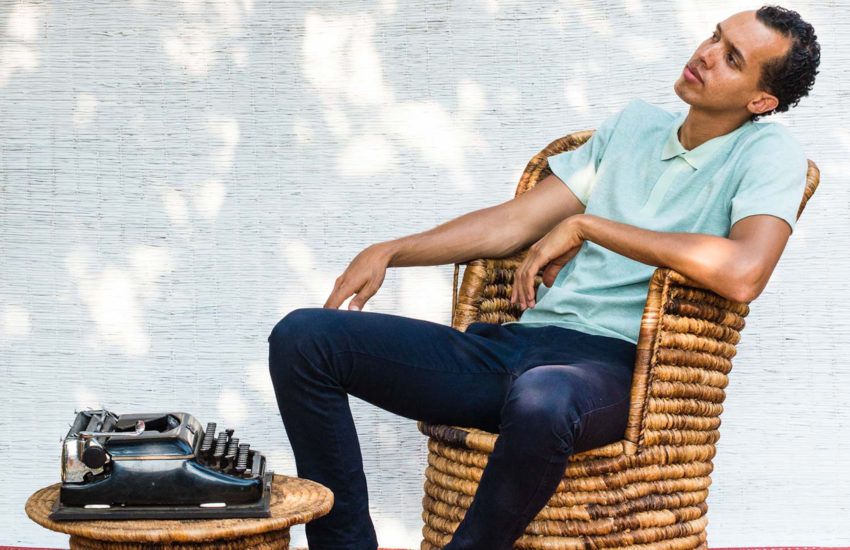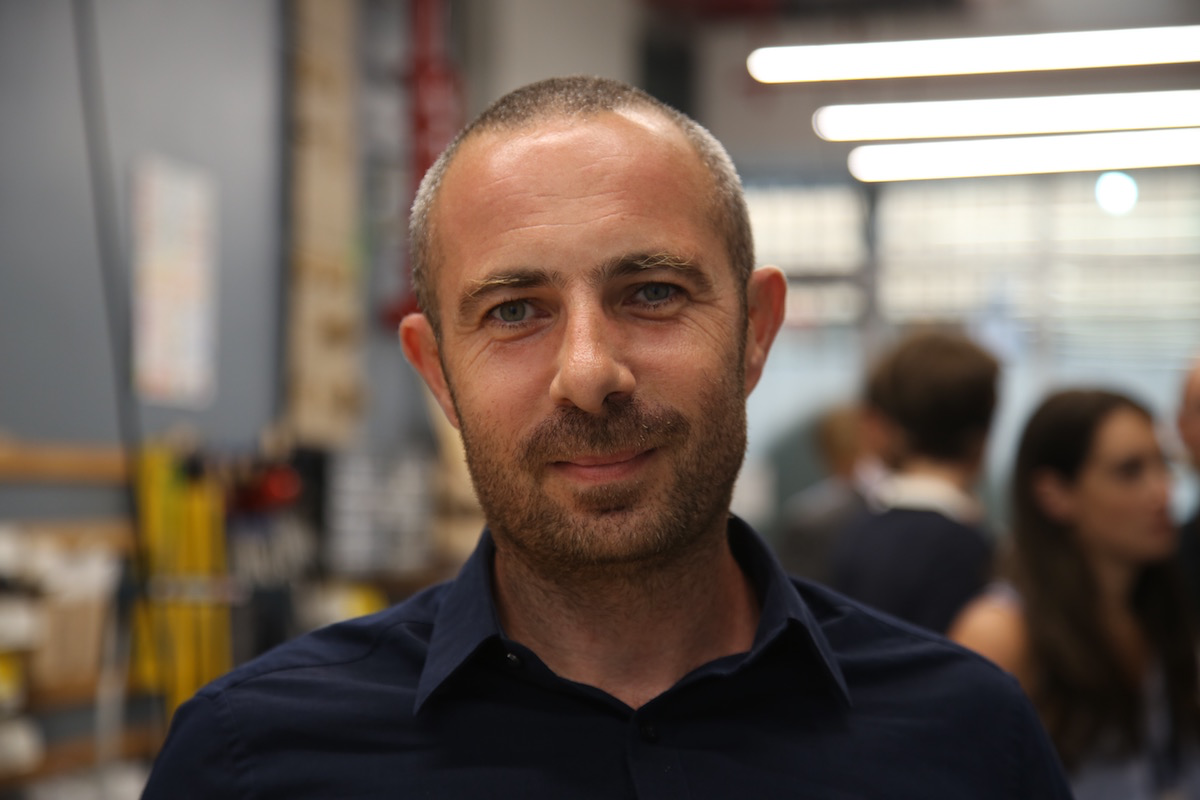High school students had the privilege to meet the author Gaël Faye, recent winner of the Prix Littéraire du Lycée (2017) and the Prix Goncourt des Lycéens (2016), on Friday, October 26 thanks to the Cultural Center.
Before Faye’s visit, French students (in the classes of myself, Mr. Morival, Ms. Roussel, Mrs. Sheehan and Mr. Soulat) read the book Petit Pays (2016) and also followed other preparations with CDI teachers (in the classes of Mme Léger and Mme Stouff). Students worked to explore “slam poetry,” which is one of Faye’s most respected forms of expression. As an introduction to the author’s work, students studied and practiced the poetic and musical structures of slam. They also explored one of the main themes of the book, the ethnic conflict in Rwanda, in order to better understand the narrative dynamics desired by the author, and to understand the writing choices and the elaboration of the book.
During Faye’s visit, a panel of students was able to ask questions that had been agreed upon by all the 10th grade classes. This exchange was truly incredible and Faye took time to answer everyone. In particular, his response concerning the creation of the narrator Gabriel’s character was illuminating. He explained that this character was named “Stéphane” at the beginning, and that the story was written with the help of an external narrator. But this point of view did not work, it did not resonate for him. So Gabriel (GA – bri – EL) was born, and the narrator became internal. It’s always interesting to understand the process of creating a book and seeing the work done to get there.
Similarly, Faye told us that he could not write while listening to music, and that he even went so far as to rent a container in an industrial zone in order to lock himself, literally, for twelve hours a day in his universe. For me, my fellow teachers, and students, this discovery of writing is always the most fascinating aspect of author talks, because it gives us a behind-the-scenes look at the process, and another perspective on the literary text is unveiled.
The conversation around the autobiographical element, or rather, the references to real life that were in the book, was very funny. The author described his phone conversation with his parents after the publication of the book. Both called their son to tell him that they were not able to recognize themselves in the characters of father and mother. Faye’s response: “Re-read the book… and do not call me until you understand it.” There was a burst of general laughter, and the author concluded: “Everyone wants to be a character in a novel.” Faye’s simplicity and honesty facilitated the exchange and allowed students and the public to receive complete and true answers.
In the second part of the activity, student volunteers participated in a masterclass, which allowed them to continue the discovery of slam and to practice with the author himself. Once again, it proved to be a rich, lively and successful artistic exchange. With their ears tuned to the music and musicality of the language, the students improvised a collective construction of a text. The exercise also unveiled the talent of our students, as one courageous volunteer from 11th grade gave a small rap performance, while another who is good at musical improvisation accompanied him on piano. It was a great moment of pride for the students and for us. This summarizes, in my opinion, our encounter with Gaël Faye: simplicity, talent and mastery.
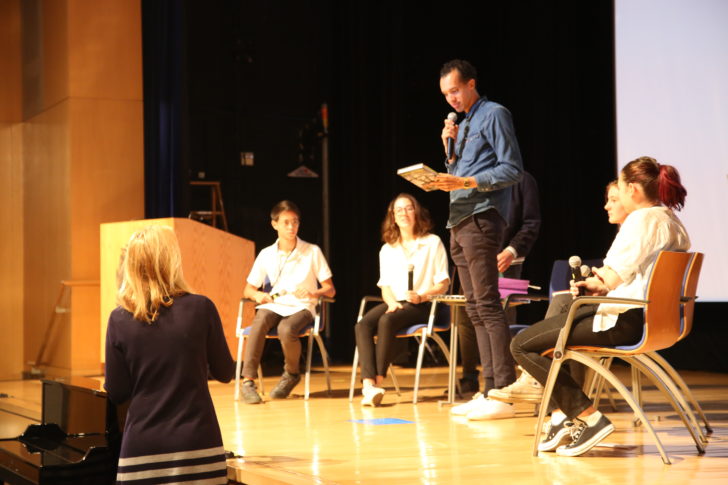
Voici les réflexions des étudiants:
Gaël Faye est un chanteur rappeur, interprète et écrivain, Franco Rwandais, qui est né au Burundi en 1982, ses oeuvres les plus célèbres comprennent outre “Petit Pays”, son roman, des chansons comme “Paris Métèque”, “Tôt le matin” et “Presque rien”. Gaël Faye est le lauréat de nombreux prix littéraires pour son roman Petit Pays dont le prix du premier roman français, le prix Goncourt des lycéens, et le prix littéraire du LFNY. Il visite de nombreuses écoles pour parler aux élèves de son roman, du slam et du rap. Pendant la conférence, quatre élèves ont posé, à tour de rôle, une question à Gaël Faye, puis des questions ont été posées par le public.
Rappeur ou slameur ?
Cette interview a commencé par une question de l’un des quatre panélistes : de quoi pensez-vous être le plus proche, slameur, rappeur, ou poète? “J’ai commencé à écrire des poèmes à treize ans. En seconde, quelques années plus tard, j’ai vu une affiche dans mon quartier pour un Atelier de rap pas loin de ma maison. Et c’est comme ça qu’au début, après avoir écrit beaucoup de poésie, j’ai transitionné au rap.”
Sur les différences entre rap et slam, Gaël Faye reste évasif : “Je ne sais pas ce qu’est un slam, ce n’est pas un genre musical,” dit-il après avoir réféchi une dizaine de secondes. Il ajoute : “Le slam, c’est un endroit où un texte est récité, et où un public écoute.” Pendant de nombreuses années, Gaël Faye a écrit du rap “pour échapper au monde extérieur”. “Le rap me donne un cadre, alors que, dans le roman, je me sens plus libre.”
“Ecrire, c’est comme un robinet qui coule”
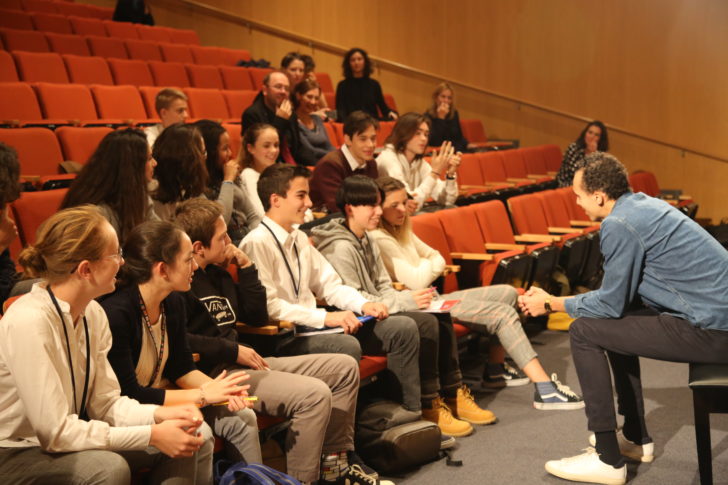 En 2014, une éditrice française, dont le fils écoutait sa musique, est venue vers Faye pour lui demander s’il s’était déjà lancé dans l’écriture. Faye qui avait déjà beaucoup écrit, ou avait écrit le début de ses idées, lui envoya le début de son livre Petits Pays qui ne comportait alors qu’une petite quinzaine de pages. Elle l’adora et aida Faye à signer chez Grasset.
En 2014, une éditrice française, dont le fils écoutait sa musique, est venue vers Faye pour lui demander s’il s’était déjà lancé dans l’écriture. Faye qui avait déjà beaucoup écrit, ou avait écrit le début de ses idées, lui envoya le début de son livre Petits Pays qui ne comportait alors qu’une petite quinzaine de pages. Elle l’adora et aida Faye à signer chez Grasset.
L’écriture du livre à succès Petit Pays a beaucoup intéressé les lycéens qui ont appris qu’il n’était pas un texte autobiographique mais un texte qui tire son histoire de l’expérience de Gaël. On peut comprendre la confusion puisque, lors de sa sortie, les membres de sa famille ont dû relire le livre pour ne pas dire “ah bah tiens, tu m’as fait comme ça” où bien “tu penses vraiment que je suis comme ça ?”.
L’un des principaux thème abordé fut la question de Gabi, le “héros” du livre. “Au début, il s’appelait “Stéphane”, mais ça ne marchait pas. J’ai donc pris mon propre nom et ajouté les lettres “bri” pour former le prénom “Gabriel”. Le prénom de “Gabi” était apparu.
Gaël Faye a expliqué, suite à la question “Avez-vous un lieu de travail particulier?”, qu’il avait uniquement besoin de quatre murs. Quatre murs seulement pour pouvoir s’immerger dans son histoire, dans son monde, dans son imagination, dans ses souvenirs. Durant la création de son roman Petit Pays, Gael Faye a loué un local dans une zone industrielle, qu’il s’est approprié: “Je m’y sentais comme chez moi”. Il ajoute : “c’est dans l’ennui que je trouve la créativité”. Et il résume l’écriture en ces termes : ” Ecrire, c’est comme un robinet qui coule.”
Un citoyen du monde
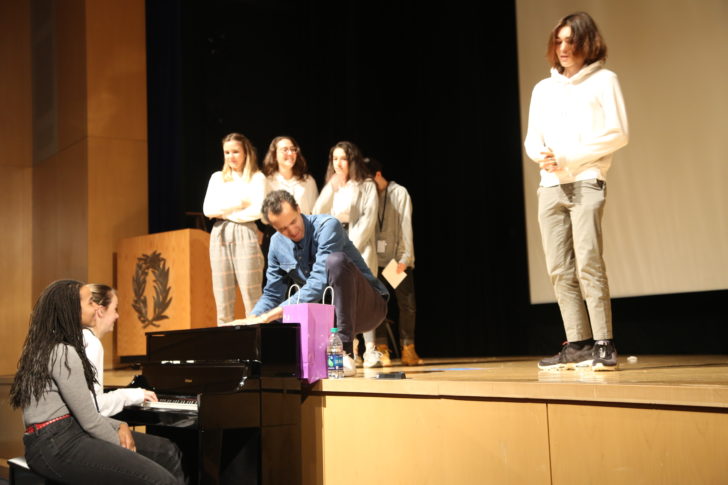 Lorsqu’un élève lui a demandé comment s’était passé son arrivée en France, il répondit : ” ce fut difficile pour moi, je ne me suis pas senti bien accueilli.” Il raconta alors qu’à son arrivée au collège, le directeur l’a emmené dans la classe et a dit aux élèves : “Voici Gaël, il a fui l’Afrique, Gaël, va t’asseoir là-bas”. Le directeur a juste dit qu’il avait fui l’Afrique, il n’a pas cherché à préciser le pays duquel il venait, d’expliquer à ses camarades pourquoi il était là, etc…
Lorsqu’un élève lui a demandé comment s’était passé son arrivée en France, il répondit : ” ce fut difficile pour moi, je ne me suis pas senti bien accueilli.” Il raconta alors qu’à son arrivée au collège, le directeur l’a emmené dans la classe et a dit aux élèves : “Voici Gaël, il a fui l’Afrique, Gaël, va t’asseoir là-bas”. Le directeur a juste dit qu’il avait fui l’Afrique, il n’a pas cherché à préciser le pays duquel il venait, d’expliquer à ses camarades pourquoi il était là, etc…
Gaël Faye ne se sent pas 50% africain ni 50% français, ou ne s’incline pas vers une culture ou l’autre. Il ne connaît pas de frontières, et se considère comme “de tout en un seul”. “Pour moi, j’appartiens à tout. Les identités sont des fusions.”
Cette rencontre avec un personnage hors du commun a profondément inspiré les élèves de seconde. Elle leur a par ailleurs permis d’en apprendre encore plus sur son histoire et celle de son pays. C’est sûr qu’après un exposé aussi instructif et divertissant, les élèves de Seconde ont rejoint le fan-club de Gaël Faye.
— Par les élèves de seconde du groupe Pizan
About the Author :
Mathieu Cladidier joined the Lycée in 2018. Originally from the Lorraine region in France, he was born and raised in Nancy. He earned a master’s degree in modern and comparative French literature at Université Nancy 2 and began teaching in 2001. Mathieu’s first experience abroad was in Stockholm, Sweden in 2011. He moved to the U.S. in 2012 to teach at École Bilingue in Berkeley, CA, where he eventually took on the newly-created position of French curriculum coordinator. In 2016, he taught at Lycée Condorcet of Sydney, Australia while also overseeing the school’s support program for non-native French speakers. Mathieu is interested in the teaching of French as a second language, introducing new technology to the teaching of French and to language acquisition as well as to neuroscience in a bilingual environment.

